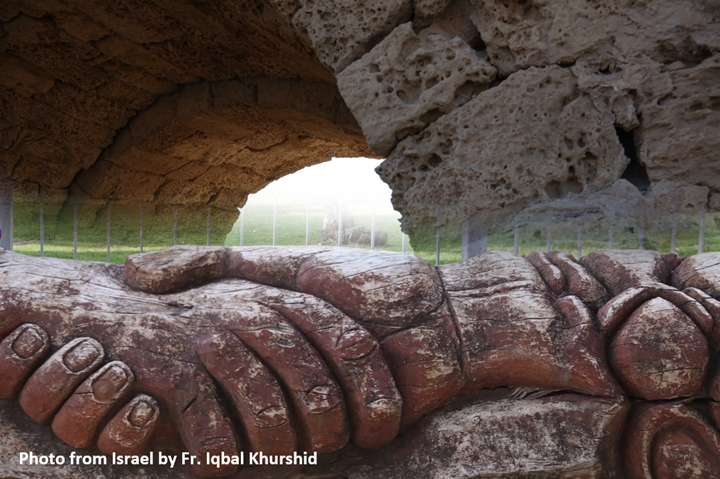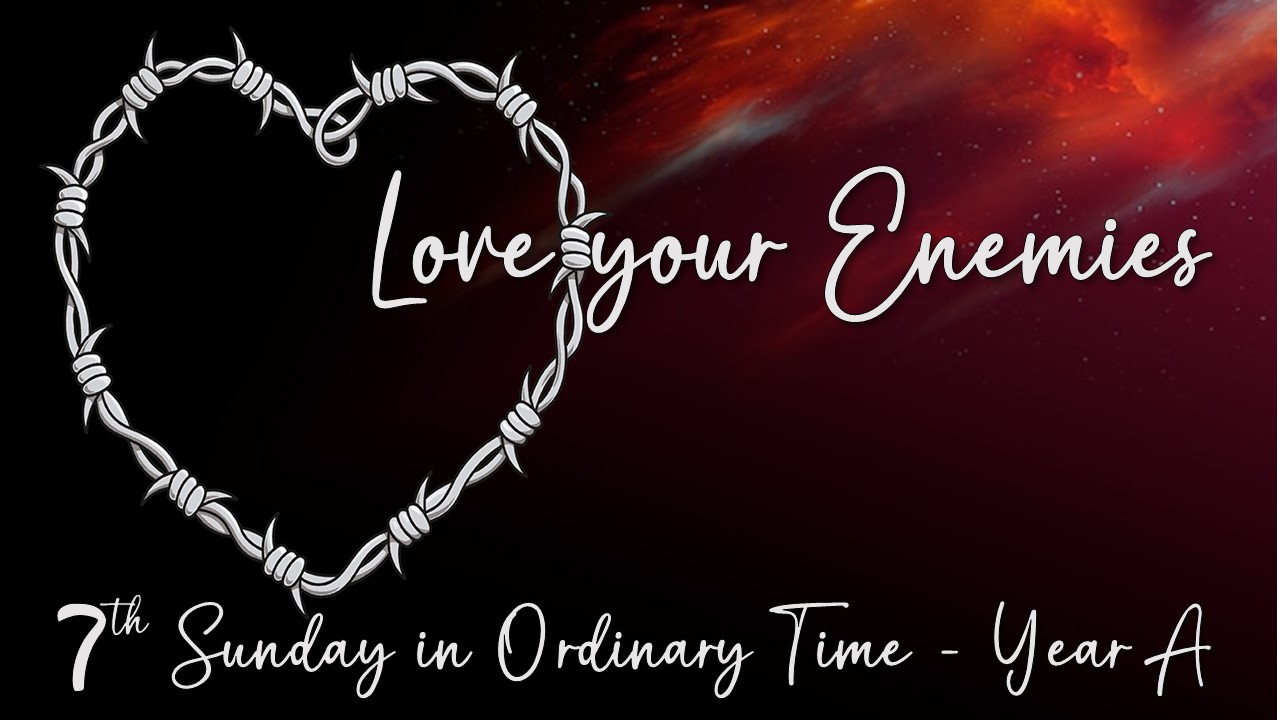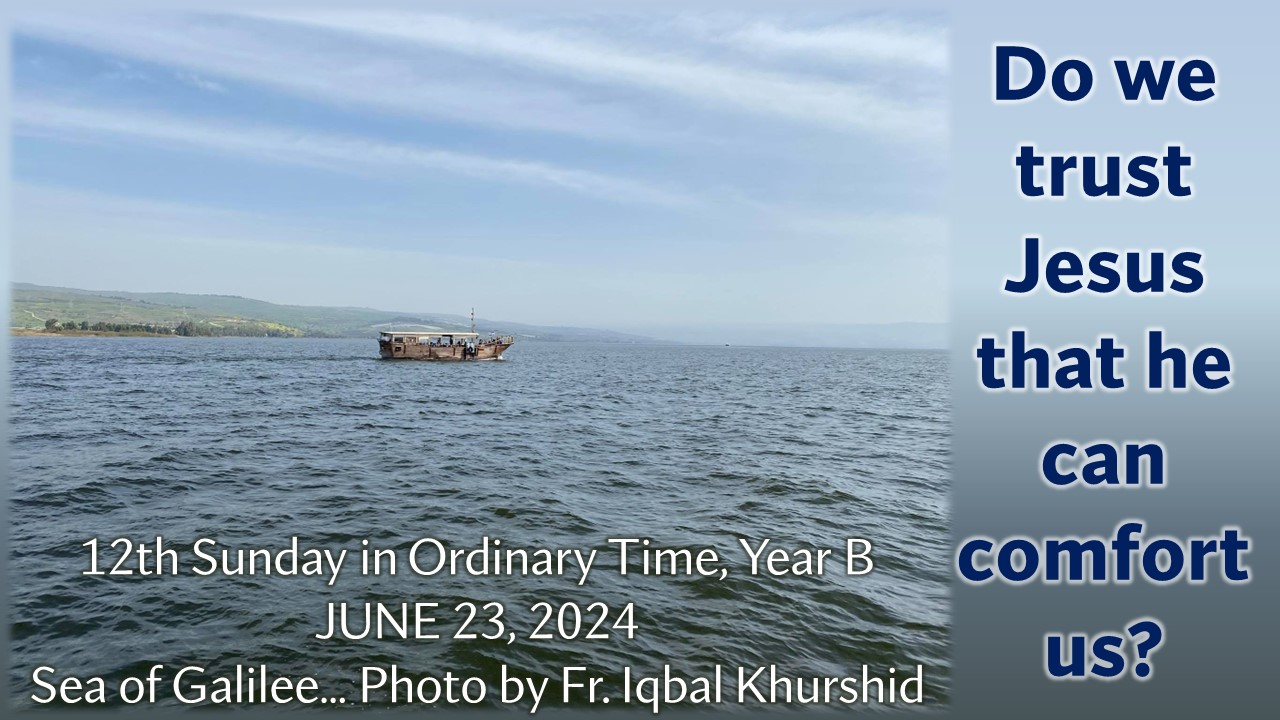
3rd Sunday of Lent – Year C – March 20, 2022
GOD’S MERCY & OUR CONVERSION
We continue our Lenten journey as we deepen our faith and spiritual life by meditating on the Word of God. First Sunday of Lent invited us to walk with Jesus as he was tempted by the devil to examine our own temptations and weaknesses and learn to rise above temptations. On the Second Sunday of Lent we climbed a mountain with Jesus to experience his splendid glory as he opened our hearts and minds to understand the true meaning of his greatest sacrifice which will never be offered again as we read in the Letter to Hebrews “ But when Christ came as a high priest of the good things that have come, then through the greater and perfect tent (not made with hands, that is, not of this creation), he entered once and for all into the Holy Place, not with the blood of goats and calves, but with his own blood, thus obtaining eternal redemption. For if the blood of goats and bulls, with the sprinkling of the ashes of a heifer, sanctifies those who have been defiled so that their flesh is purified, how much more will the blood of Christ, who through the eternal Spirit offered himself without blemish to God, purify our conscience from dead works to worship the living God!” (9:11-14).
St. Augustine reflecting on the passion of Christ says “This is generally understood of Christ, the head, as every Christian acknowledges. When day was fading into evening, the Lord laid down his life on the cross, to take it up again; he did not lose his life against his will. Here, too, we are symbolized. What part of him hung on the cross if not the part he had received from us? How could God the Father ever cast off and abandon his only Son, who is indeed one God with him? Yet Christ, nailing our weakness to the cross (where, as the Apostle says: Our old nature was nailed to the cross with him), cried out with the very voice of our humanity: My God, my God, why have you forsaken me? The evening sacrifice is then the passion of the Lord, the cross of the Lord, the oblation of the victim that brings salvation, the holocaust acceptable to God. In his resurrection he made this evening sacrifice a morning sacrifice. Prayer offered in holiness from a faithful heart rises like incense from a holy altar. Nothing is more fragrant than the fragrance of the Lord. May all who believe share in this fragrance. Therefore, our old nature, in the words of the Apostle, was nailed to the cross with him in order, as he says, to destroy our sinful body, so that we may be slaves to sin no longer”.
The holy men and women in our Christian faith are the extraordinary examples of God’s mercy and our conversion as someone said, “saints have past and sinners have the future”. I just like to share the conversion story of St. Augustine who was born in 354 A.D in Africa. His mother, St. Monica, was a devout Christian, who raised her son with a Christian education; however, he was not baptized. Augustine’s father was a pagan who did not convert to Catholicism until on his death bed and he had taught his son to be more concerned with worldly goods and pleasures. At age 16, St. Augustine stole fruit he did not want from a neighboring garden simply because it was forbidden, as described in his autobiography, The Confessions. “It was foul, and I loved it. I loved my own error—not that for which I erred, but the error.” (Confessions 2:4). St. Augustine’s friends were boys that bragged about their sexual conquests. He himself had a lover for fifteen years and fathered an illegitimate son. Throughout these experiences, St. Monica continued to pray for the conversion of her son and husband. At the age of 32, St. Augustine heard a young voice tell him to take and read St. Paul’s Epistle to the Romans. St. Augustine was converted. He received baptism from St. Ambrose, returned home, and gave all to the poor. He was consecrated Bishop of Hippo in 395.
St. Augustine’s story reminds us first and foremost, that hope is never lost. God can work and move in the most hardened of hearts for conversion, perhaps when we least expect it. All sin, no matter how grave, can be forgiven if we repent. This is especially good to remember in this year of Mercy declared by Pope Francis. Like St. Monica, we should never tire of praying for the conversion of family members, friends, and acquaintances just as St. Monica prayed unceasingly for the conversion of both her son and her husband. St. Monica’s prayers were eventually answered.
In the First Reading today Moses is having a beautiful encounter with God in the burning bush. The close encounter of Moses with God is the beginning of his conversion as he opens his heart and mind to listen to God’s voice. God says to Moses that this hidden cry of the people has reached up to him: He has heard, He has seen their oppression and sufferings … And He has decided to take action by sending Moses to rise and nourish the dream of freedom in the Israelites and to reveal to them that this dream is His will: to make of Israel a free people, His people, bound to him by a Covenant of love, called to witness the faithfulness of the Lord before all the people. But for Moses to be able to fulfil his mission, God instead wants him to descend with him in the midst of the Israelites. Moses’ heart must become God’s, attentive and sensitive to the suffering and dreams of men and women, to those who cry in secret when they raise their hands towards heaven, because they have nothing else to hold onto on Earth. It is the groaning of the Spirit, and Moses must listen not with his ears but with his heart. Today we can ask ourselves, to learn how to listen with our own heart. The one who teaches how to listen this way is the Spirit. He is the one who teaches us to listen with the heart. To open it. He teaches to call God “Abba, Father”.
Cardinal John Henry Newman once talking about his conversion wrote “God has created me to do Him some definite service. He has committed some work to me which He has not committed to another. I have my mission. I may never know it in this life, but I shall be told it in the next. I am a link in a chain, a bond of connection between persons. He has not created me for naught. I shall do good; I shall do His work. I shall be an angel of peace, a preacher of truth in my own place, while not intending it if I do but keep His commandments. Therefore, I will trust Him, whatever I am, I can never be thrown away. If I am in sickness, my sickness may serve Him, in perplexity, my perplexity may serve Him. If I am in sorrow, my sorrow may serve Him. He does nothing in vain. He knows what He is about. He may take away my friends. He may throw me among strangers. He may make me feel desolate, make my spirits sink, hide my future from me. Still, He knows what He is about. We learn from Cardinal Newman to follow the words of scripture and “Always be ready to give an explanation to anyone who asks you for a reason for your hope.” (1 Peter 3:15).
God through Moses freed Israelites from bondage of Egyptian slavery with his mighty right hand. God loves his people, and he never leaves them alone as St. Paul says “he can not deny himself” for he has written our names on the palms of his hands, and he will never forsake or forget us.
In the Second Reading St. Paul wants us to look back to ancestors and believe that God’s mercy is needed for our conversion “Now these things occurred as examples for us, so that we might not desire evil as they did. And do not complain as some of them did and were destroyed by the destroyer”. How wonderful to believe in the mercy of God so that our hearts may be converted back to our heavenly Father? Prophet Ezekiel right quoted “Now you, mortal, say to the house of Israel, thus you have said: “Our transgressions and our sins weigh upon us, and we waste away because of them; how then can we live?” Say to them, As I live, says the Lord God, I have no pleasure in the death of the wicked, but that the wicked turn from their ways and live; turn back, turn back from your evil ways; for why will you die, O house of Israel? And you, mortal, say to your people, The righteousness of the righteous shall not save them when they transgress; and as for the wickedness of the wicked, it shall not make them stumble when they turn from their wickedness; and the righteous shall not be able to live by their righteousness when they sin. Though I say to the righteous that they shall surely live, yet if they trust in their righteousness and commit iniquity, none of their righteous deeds shall be remembered; but in the iniquity that they have committed they shall die. Again, though I say to the wicked, “You shall surely die,” yet if they turn from their sin and do what is lawful and right— if the wicked restore the pledge, give back what they have taken by robbery, and walk in the statutes of life, committing no iniquity—they shall surely live, they shall not die. None of the sins that they have committed shall be remembered against them; they have done what is lawful and right, they shall surely live” (33:10-16). Also please do read (Psalm 95 & Luke 15:1-32).
The Gospel for this third Sunday of Lent speaks to us about God’s mercy and of our conversion. Unfortunately, every day the press reports bad news: homicides, accidents, catastrophes and recently war between Russia and Ukraine has shaken the whole world and everyone is praying for the peace in the world and especially between these two countries. Why there is so much suffering? Why can’t people live in peace and harmony? And there are many other questions we raise and ask ourselves. In today’s Gospel passage, Jesus refers to two tragic events which had caused a stir: a cruel suppression carried out by Roman soldiers in the temple, and the collapse of the tower of Siloam in Jerusalem, which resulted in 18 deaths. Why is Jesus using these two examples? I think this could be the possible answer to these questions:
Jesus mentions the tower in Siloam in the context of answering a question about a recent tragedy in Jerusalem. Some people told Jesus about a group of Galileans (Galileans) was used to refer to members of a fanatical sect (Zealots), followers of Judas of Galilee, who fiercely resented the taxation of the Romans. Galileans was also term used by some in the Roman Empire to name the followers of Christianity, called in this context as the Galilean faith. Judas Iscariots was also one of the Zealot members) who had come to the temple to sacrifice, and Pontius Pilate slaughtered them, probably due to a public disturbance the Galileans were causing (Luke 13:1). The men who related this story to Jesus, may have been trying to lure Him into taking sides, either for or against Pilate, or they may have simply been curious about Jesus’ reaction to the massacre. Whatever their motivation, Jesus’ response is sobering: “Do you think that these Galileans were worse sinners than all the other Galileans because they suffered this way? I tell you, no! But unless you repent, you too will all perish” (verses 2–3).
Jesus continues the conversation by mentioning another current event, this one involving the tower of Siloam: “Or those eighteen who died when the tower in Siloam fell on them—do you think they were more guilty than all the others living in Jerusalem? I tell you, no! But unless you repent, you too will all perish” (Luke 13:4–5). The fall of the tower of Siloam is not mentioned in other historical records, and, since the Bible gives no more detail of the structure’s collapse, we cannot be sure what the tower was for or why it fell. The tragedy was obviously well-known to Jesus’ hearers. Siloam was an area just outside the walls of Jerusalem on the southeast side of the city. A spring-fed pool was there, which was the scene of one of Christ’s miracles (John 9). The tower of Siloam may have been part of an aqueduct system or a construction project that Pilate had begun. In any case, the tower fell, and eighteen people were killed in the catastrophe.
Jesus is aware of the superstitious mentality of his listeners, and he knows that they misinterpreted that type of event. In fact, they thought that, if those people died in such a cruel way it was a sign that God was punishing them for some grave sin they had committed, as if to say, “they deserved it”. Instead, the fact that they were saved from such a disgrace made them feel “good about themselves”. They “deserved it”; “I’m fine”.
Jesus clearly rejects this outlook, because God does not allow tragedies to punish sins, and he affirms that those poor victims were no worse than others. Instead, he invites his listeners to draw from these sad events a lesson that applies to everyone, because we are all sinners; in fact, he said to those who questioned him, “Unless you repent you will all likewise perish”.
Today too, seeing certain misfortunes and sorrowful events, we can be tempted to “unload” the responsibility onto the victims, or even onto God himself. But the Gospel invites us to reflect: What idea do we have of God? Are we truly convinced that God is like that, or isn’t that just our projection, a god made to “our image and likeness”?
Jesus, on the contrary, invites us to change our heart, to make a radical about-face on the path of our lives, to abandon compromises with evil — and this is something we all do, compromises with evil, hypocrisy…. I think that nearly all of us has a little hypocrisy — in order to decidedly take up the path of the Gospel. But again there is the temptation to justify ourselves. What should we convert from? Aren’t we basically good people? — How many times have we thought this: “But after all I am a good man, I’m a good woman” … isn’t that true? “Am I not a believer and even quite a churchgoer?” And we believe that this way we are justified.
Unfortunately, each of us strongly resembles the tree that, over many years, has repeatedly shown that it’s infertile. But, fortunately for us, Jesus is like a farmer who, with limitless patience, still obtains a concession for the fruitless vine. “Let it alone this year” — he said to the owner — “we shall see if it bears fruit next year” (cf. v. 9). God gives us the chance to bear fruit and convert by repenting from our sins.
There is a little story from St Thérèse of the Child Jesus, when she prayed for that man who was condemned to death, a criminal, who did not want to receive the comfort of the Church. He rejected the priest, he didn’t want forgiveness, he wanted to die like that. And she prayed in the convent, and when, at the moment of being executed, the man turned to the priest, took the Crucifix and kissed it. The patience of God! He does the same with us, with all of us. How many times, we don’t know the Lord saves us because he has great compassion for us. And this is his mercy. It’s never too late to convert, but it’s urgent. Now is the time! Let us begin today.
Let me conclude my reflection with this story which will always help us to understand that when we believe in the mercy of God, there is always a conversion of hearts and minds.
There was a boy, whose family was very wealthy. One day his father took him on a trip to the country, where he aimed to show his son, how poor people live. So they arrived to a farm of a very poor family, as he considered. They spent there several days. On their return, the father asked his son, did he like the trip.
“Oh, it was great, dad” – the boy replied. “Did you notice how poor people live?” “Yeah, I did”- said the boy. The father asked his son to tell in more details about his impressions from their trip.
“Well, we have only one dog, and they have four of them. In our garden there is a pool, while they have a river that has no end. We‘ve got expensive lanterns, but they have stars above their heads at night. We have the patio, and they have the whole horizon. We have only a small piece of land, while they have the endless fields. We buy food, but they grow it. We have high fence for protection of our property, and they don’t need it, as their friends protect them.”
The father was stunned. He could not say a word.
Then the boy added: “Thank you, dad, for letting me see how poor we are.”
Thank you, Jesus, for your mercy and gift of conversion that we are able to call ourselves your disciples. Thank you for dying on the Cross for us to make us feel special in spite of our shortcomings and failures. Thank you, Jesus, for being patient with us to wait to see that we can bear fruit which will last forever. Thank you, Jesus, for being our Saviour and saving us everyday against the evil forces of the world.
Other Sermons In This Series

7th Sunday in Ordinary Time Year A ~ February 19, 2023
February 17, 2023

2nd Sunday of Advent- Year A – December 4, 2022
December 02, 2022

12th Sunday in Ordinary Time, Year B ~ June 23, 2024
June 20, 2024

